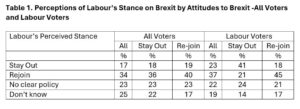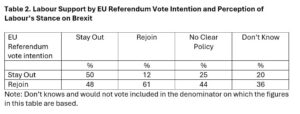One key feature of Sir Keir Starmer’s tenure as Labour leader has been a firm acceptance of the result of the 2016 referendum on Britain’s membership of the EU. The party even voted for the Trade and Co-operation Agreement when it was finally concluded at the end of 2020. Although the party has indicated a wish to soften Brexit in some respects, it does not wish to reopen the issue of single market and customs union membership, and has seemingly been inclined to downplay the issue.
Not least of the reasons for this stance has been a wish to reconnect with the many Leave voters the party lost in 2019, as symbolised by the loss of many so-called ‘Red Wall’ constituencies in 2019. However, while Labour has gained ground since 2019 among supporters of Brexit, it has also increased its popularity among opponents. As a result, much of the party’s support still comes from those who now would vote to re-join the EU. For example, in the latest Redfield & Wilton poll for The UK in a Changing Europe published today, as many as 74% of those who say they would vote Labour in a general election say they would vote to re-join in another EU referendum. That is only a little down on the equivalent figure for 2019.
So, does this mean that voters do not believe Labour’s stance on Brexit? Or, given the party’s apparent reluctance to say very much about the issue at all, perhaps voters are simply unclear about where the party stands on Brexit but are supporting the party nonetheless?
Over the course of the last year Redfield & Wilton have regularly asked voters where they think each of the parties stands on EU membership. Table 1 shows the pattern of responses when asked about Labour in the latest poll. (These results are not dissimilar to the readings in previous polls.) It does so not only for all voters, but also for just those who would vote Labour, including in both cases distinguishing between supporters as well as opponents of Brexit.
It seems that many voters are not clear where Labour stands on Brexit. Not only do one in four say they do not know Labour’s position on the issue, but almost as many feel the party has no clear policy. That perhaps may be regarded as a signal of success by a party that has wanted to downplay the issue. However, what cannot be regarded as a success is that among those who reckon they do know where Labour stands, twice as many believe the party backs re-joining as associate it with its actual stance of staying out. Moreover, this is just as true among those who themselves back staying out as it is among those who want to re-join.
The picture is not that different among current Labour supporters. As we might anticipate, they are somewhat less likely to say ‘Don’t know’, and somewhat more likely to say ‘Stay out’. Nevertheless, at 23%, the proportion who think the party backs staying out is well short of the 37% who reckon it backs re-joining.
However, opponents and supporters of Brexit within Labour’s ranks do have different perceptions. Among those who have a view about what the party believes, those who back staying out of the EU are twice as likely as those who would prefer to re-join to believe that Labour is in favour of staying out. In contrast, those who would like to re-join – a much larger group – are twice as likely as those who back Brexit to believe that Labour would like to re-join. It is their perceptions that explain why so many Labour supporters believe Labour is a re-join party.
But does any of this make any difference to the pattern of Labour support? Are supporters of Brexit more likely to back the party if they think it wants to stay out of the EU – and are opponents of Brexit more supportive if they feel it wants to re-join? And is there any sign that the widespread perception that the party has no clear policy helps the party attract voters?
Table 2 shows separately for current supporters and opponents of Brexit the proportion who say that they will vote for Labour broken down by their perceptions of the party’s policy position. It shows that the probability that someone intends to vote Labour does indeed depend on where Labour is thought to stand on the issue. Among those who would vote to stay out, support for the party is twice as high among those who think Labour shares their view as it is among those who think Labour has no clear policy, and four times as high as it is among those who would re-join. At the same time, just over three in five (61%) of re-joiners who believe that Labour shares their preference say they will vote for the party, well above the figure for the other groups of re-joiners in the table.
However, perception is not everything. Irrespective of where they think the party stands on Brexit, those who back Brexit are generally less likely than re-joiners to support Labour. For example, Brexiteers who think Labour does not have a clear policy on the issue are 19 points less likely than re-joiners to say they will vote for the party. Indeed, those re-joiners who think that Labour wants to stay out are as likely as Brexiteers who share that perception to say that they will vote Labour.
Labour finds itself in a curious position on Brexit. Among those who back Brexit to whom the party has been trying especially to appeal, support for the party is much higher among those who reckon Labour shares their views. Indeed, it is also somewhat higher among those who simply reckon the party has no clear view on the issue. However, re-joiners seem inclined to back the party in substantial numbers irrespective of where they think the party stands on the issue. It is that apparent disregard of Labour’s stance by re-joiners that helps explain why, despite then party’s official stance on Brexit, Labour finds itself still being backed by a heavily pro-EU set of voters.
This blog also appears on the UK in a Changing Europe website
By John Curtice
John Curtice is Senior Research Fellow at NatCen and at 'UK in a Changing Europe', Professor of Politics at Strathclyde University, and Chief Commentator on the What UK Thinks: EU website.




If Norfolk (for example) decided they wanted to be free from Westminster’s influence and didn’t care about the hit to their standard of living, their ability to travel freely within the UK and the ability of their manufacturers to sell to and buy from it we’d think they were mad. That’s exactly whet Brexit has done for the UK as a whole. A complete disaster.
Such were the lies told during the Brexit campaign that it remains a taboo subject for most sensible politicians. GIve it five or ten years until the older folks who voted for it are fewer in number and we can hopefully have a sensible discussion as a country. Our Children deserve no less.Report
I vote Labour, But I voted to come out of the control of Brussels!!! I don’t want another country controlling our Country & telling us what to buy and what currency to use!!!! That’s called Facism???????Report
My personal opinion is that you forget that the UK was represented within the EU institutions at all levels and agreed to the decisions made in « Brussels ». In comparison the state of New York i.e. could then, following your perception, argue that the US Government is a fascist government 😱 … Personnally, I won’t go that road.Report